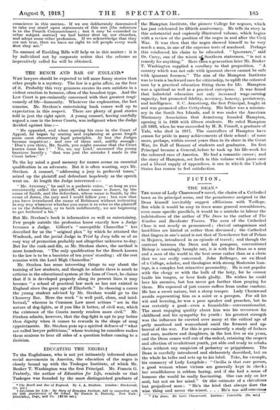EDUCATING THE NEGRO-t To the Englishman, who is not yet
intimately informed about social movements in America, the education of the negro is closely bound up with the Tuskegee Institute, of which Mr. Booker T. Washington was the first Principal. Mr. Francis G. Peabody, the author of Education for Life, reminds us that Tuskegee was founded by the most distinguished graduate of
• The Bench and Bar of England. By J. A. Strahan. London: Blaekaood. 1.5s, net.] t Education for Life: the Story of Hampton Insditute, told in connection with the 50th Anniversary of the School. By Francis E. Peabody. New York: Doubleday, Page, and Co. iftso new the Hampton Institute, the pioneer College for negroes, which has just celebrated its fiftieth anniversary. He tells its story in this substantial and copiously illustrated volume, which begins with a review of the position of the negro in and after the Civil War. It was then that the negro showed himself to be very much a man, in one of the supreme tests of manhood. Perhaps this reinforced his claim to be educated. "Ignorance," said Dr. Curry, one of the wisest oiSouthern statesmen, "is not a remedy for anything." More tran a generation later Mr. Booker T. Washington supplied a corollary to that proposition. "A country which was not safe with ignorant slaves cannot be safe with ignorant freemen." The aim of the Hampton Institute was to train a backward race for citizenship, to uplift the coloured men by a practical education fitting them for life. Hampton was a spiritual as well as a practical enterprise. It was found that industrial education not only increased wage-earning capacity, but promoted fidelity, accuracy, honesty, persistency, and intelligence. S. C. Armstrong, the first Principal, fought at and was promoted after Gettysburg. His father was a missionary in the South Sea Islands, and it was under the American Missionary Association that Armstrong founded Hampton, opening it in 1868 with fifteen students. He ruled Hampton till 1893, When he was succeeded by H. B. Frissell, a graduate of Yale, who died in 1917. The controllers of Hampton have reason for pride in wany achievements of their school : of none more, perhaps, within recent years than in its share in the Great War, its Roll of Honour of students and graduates. Its first Principal became a General, before he took up his life-work for the coloured race of America. He had a romantic career; and the story of Hampton,. set forth in this volume with pious care and a liberal supply of appendices, is one in which the United States has reason to feel satisfaction.


































 Previous page
Previous page